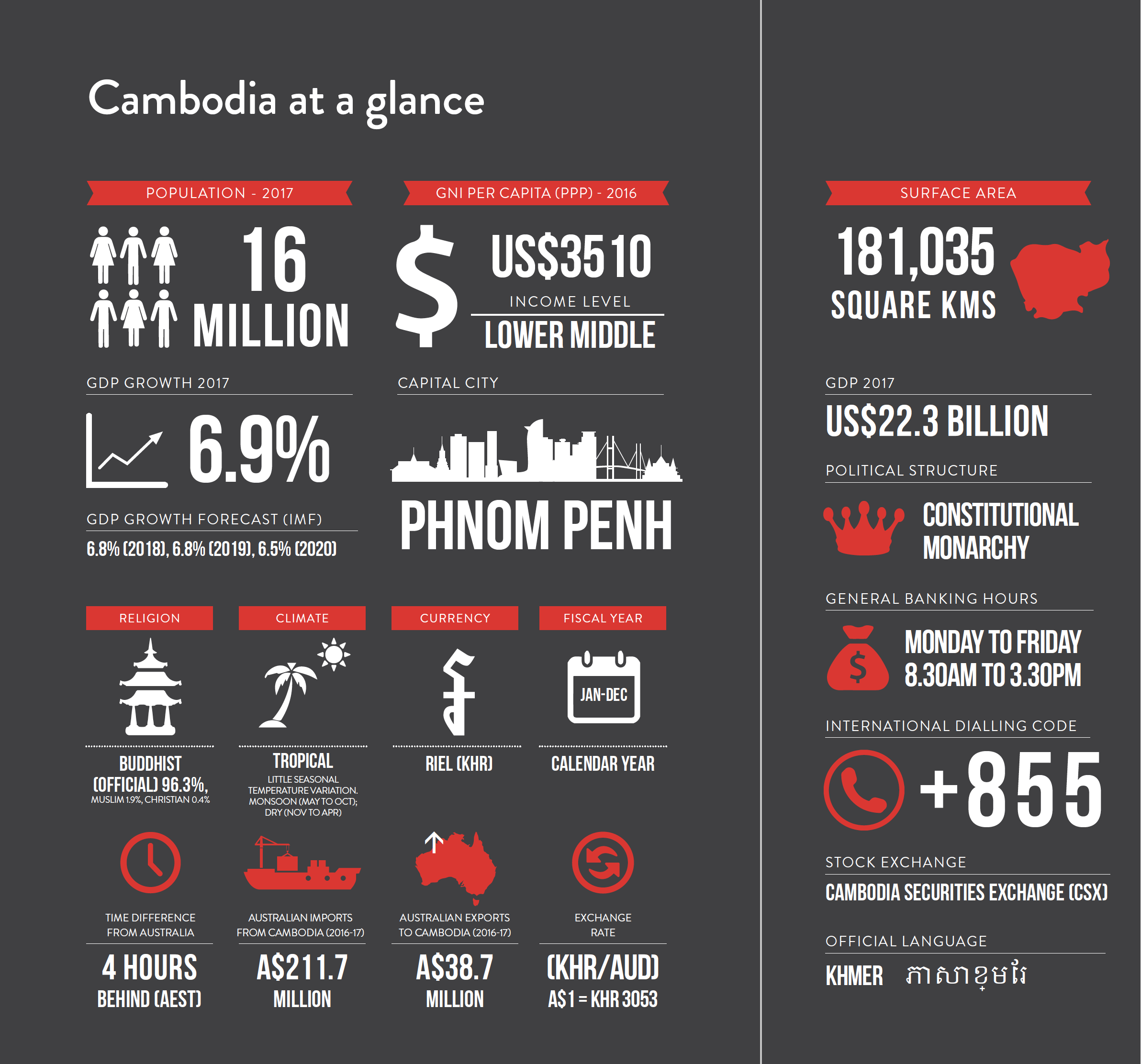Doing Business in Cambodia
There are increasing opportunities for Australian trade and investment in Cambodia, particularly in education and agriculture.
There are increasing opportunities for Australian trade and investment in Cambodia, particularly in education and agriculture.
There are increasing opportunities for Australian trade and investment in Cambodia, particularly in education and agriculture, while garment manufacturing, tourism and construction have been the largest drivers of growth in recent years.
Strong growth in the number of Cambodians studying in Thailand and Malaysia suggests there is demand for training delivered locally by Australian providers. Around 60 per cent of the population is under the age of 30, enrolment rates in school are improving and there is a growing middle class able to afford private education.
Cambodia is a party to the ASEAN-Australia-New Zealand Free Trade Agreement (AANZFTA), which delivers benefits for Australian businesses in the areas of tariff reduction and elimination, economic engagement and cooperation, greater certainty for service suppliers and investors and supply chain opportunities.

There are increasing opportunities for Australian trade and investment.
There are increasing opportunities for Australian trade and investment in Cambodia, particularly in education and agriculture, while garment manufacturing, tourism and construction have been the largest drivers of growth in recent years.
Strong growth in the number of Cambodians studying in Thailand and Malaysia suggests there is demand for training delivered locally by Australian providers. Around 60 per cent of the population is under the age of 30, enrolment rates in school are improving and there is a growing middle class able to afford private education.
Cambodia is a party to the ASEAN-Australia-New Zealand Free Trade Agreement (AANZFTA), which delivers benefits for Australian businesses in the areas of tariff reduction and elimination, economic engagement and cooperation, greater certainty for service suppliers and investors and supply chain opportunities.
Want to discover opportunities in other Asian countries? Expand your knowledge on doing business in Thailand and Vietnam, as well as other countries with market-leading information and insights from Asialink Business.
Relationships are very important.
Businessmen may be addressed as Mr given name. For example, Mr Hok Chay could be addressed as Mr Hok. Businesswomen should be addressed as Madam. It should also be noted that many senior managers or high level officials may have the title Your Excellency.
Cambodians are generally not straightforward in terms of business dealings. Avoid confrontational styles in business meetings in favour of a more subtle style.
When Cambodians say yes, this may only mean that they hear and understand you – not necessarily that they agree, or that they will do as you ask.
Correspondence should always be addressed to the most senior decision maker.
Delegating is not common. Hence any decisions will always take considerable time, as each person in the chain considers his/her response.
For men, lightweight suits are appropriate. Bring at least one dark suit and tie for official occasions. Trousers and an open neck shirt are acceptable at the office.
For women, most styles of western dress are acceptable, but avoid very short skirts and brief tops. Cotton is the most appropriate fabric in the heat.
Cambodians traditionally greet each other by pressing their palms together in front of their bodies and bowing, called a sompeah, with the youngest or lowest rank person initiating the greeting. However it is considered acceptable for foreigners to shake hands with Cambodians of both sexes.
When visiting, small gifts are appreciated, always offered with the right hand. To be particularly polite, support your right elbow with the fingers of your left hand when offering.
A business card in English, with Khmer on the reverse side, should be presented.
Find out in advance if your contact is fluent in English and arrange an interpreter if they are not.
When entering a house, your shoes should be left outside. Showing the soles of your feet when seated opposite a person is considered rude. Do not cross your legs - keep your feet flat on the floor.
Expect to be invited to dine out or play golf. It will take time to establish a mutual level of trust, so make the effort get to know your contacts and build your business and government connections.